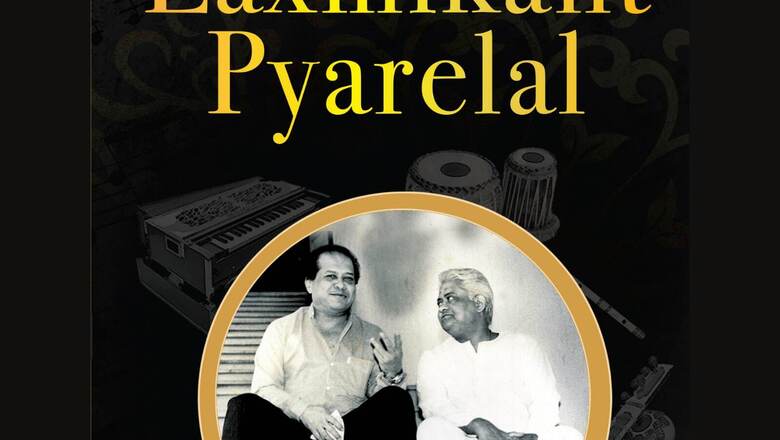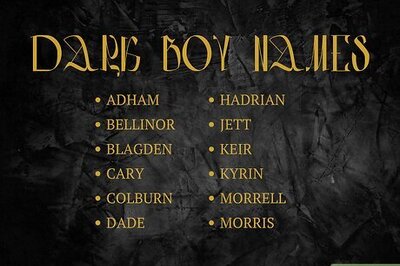
views
‘I have been a film music buff since I can remember, with various favourite composers from Naushad to Madan Mohan, S.D. Burman and Shankar-Jaikishan. When I was training as an actor at the Film & Television Institute of India (FTII), Pune, I heard a song, “Hansta Hua Noorani Chehera”, and I came to know it was from a small film called Parasmani and composed by two newcomers named Laxmikant-Pyarelal.
Aur meri zubaan se yeh shubh shabd nikal gaye—“Yeh bahut bade banenge (And the auspicious words slipped out, that these two will become big)” But from their names, I thought they must be hailing from some village!
Then, a few days later, I heard “Woh Jab Yaad Aaye” from the same film, and I laid a bet with my colleagues that they would soon outshine Shankar-Jaikishan, who had started becoming a bit predictable. When the music of Dosti came out, I even bought a gramophone and the Dosti record, though I could barely afford such things then!
And guess what? The first role I signed after I left FTII was a small one in Taqdeer, produced by Rajshri Productions in 1967. And they were the film’s music directors. There was a song filmed on Farida Jalal, “Aaiye Bahaar Ko Hum Baant Le”, and I was a part of that song too, strumming a guitar. I flipped over Rafi saab’s “Jab Jab Bahaar Aayi” and most of the other songs, which were hits even though the film flopped.
When I turned filmmaker, the producer of my third film, Gautam Govinda, had worked with them earlier and had signed them, and Laxmi-ji met me enthusiastically, as I was then known as the director of the super-hit Kalicharan. The first song we recorded was “Ek Rut Aaye Ek Rut Jaaye”, and Pyare-bhai also loved my narration of the visuals—the sun shining over arid land, the poverty and the effects of famine. It was one of Anand Bakshi’s most beautifully written songs and Pyare-bhai’s atmospheric orchestration to a superb tune by Laxmi-ji earned Laxmi-Pyare and me a call from none other than Raj Kapoor. It was nothing less than an Oscar for me!
And yet, people said that I was a good director but had no music sense, so I thought my next film should be a musical. It was Karz with a pop singer as a hero.
Obviously, I should have signed R.D. Burman for it, but I was impressed by their range and told L-P to accept the challenge that I was giving them. And how beautifully they scored!
Pyare-bhai had made different musical pieces for the theme, which was the first to be recorded. He liked the fifth one he offered, but I preferred the third, which is the famous one now. I don’t know music, but I react to it, and after the theme music became cult, Pyare-bhai admitted that I had made the correct choice!
The saga of Laxmikant-Pyarelal is the story of two emperors, each unrivalled in his own right. Only they could have given a Western colour to a ghazal-like composition in “Dard-e-Dil Dard-e-Jigar”, in which they used a drum instead of a dholak! And they decided to use Mohammed Rafi’s voice in a score that had Kishore Kumar singing all other songs. The complex tune had all the three verses structured differently, and hat’s off to Laxmikant for treating the song that way.
After our Krodhi flopped badly—but the music did not—I told them that my next film, Hero, would be made without stars, and that the music had to be a hit or we would die! And again, look at the terrific music with which they came up!
The standout song from Hero today is “Lambi Judaai”, and I was keen that Reshma, from Pakistan, should sing this litany of separation: we had heard her at Raj Kapoor’s party. Laxmi-ji told me that such artistes rarely sing film songs, as their scale and tone are different. He told me that folk singers are like lions we can use only occasionally!
When I still insisted, and Reshma agreed to sing, Laxmi-ji told me that we should get the song written first from Anand Bakshi according to the situation, and that he would compose it in her style, not in the L-P way, so that she would be comfortable!
On the day Reshma was recording, I entered the recording studio to find Pyare-bhai rehearsing with nine musicians. I thought more would come, as L-P’s normal orchestra would be around 100-strong, but he told me that Reshma would sing in her free, open way and the orchestration should make her voice stand out, not intimidate her.
Such was the visionary greatness of these two composers. I remember that I had penned the thematic lines for Karma in my script, “Har karam apna karenge ae watan tere liye / Dil diya hai jaan bhi denge ae watan tere liye”. I gave Laxmi-ji the lines and was leaving his sitting room, as many producers were waiting, when he called me back. He had composed the tune you hear now, a tune he made in less than five minutes but lives on 35 years down!
Pyare-bhai asked me what kind of orchestration I had thought of for the same song, and my answer was, “It should be like Delhi’s Vividh Bharati music!” And so the theme music was made by him in that fashion!
Our understanding and affection was so complete and wonderful that you can just see the progression of our music— Ram Lakhan, Saudagar, Khal Nayak. I can write a 500-page book on these magicians who met so many challenges successfully!
“Choli Ke Peeche”, the much-maligned song from Khal Nayak, around which an artificial controversy was created, was another example of their brilliance. Bakshi ji asked me what kind of a song I wanted, and my reply was that it should be the kind of raunchy song classically found in North Indian folk, if need be with abuses, as my male lead is a villain.
I was going to Mount Abu to hunt for locations and I saw a small kid on the way playing an attractive tune on his iktara (a single-stringed instrument). I recorded it, tipped the boy, and played it to Laxmi-ji. He liked it and modified the tune, and we added the refrain “kuk-kuk-kuk-kuk”.
Later, Bakshi ji called me up and said, “I have written the mukhda.” When he recited the words, “Choli ke peeche kya hai”, I said I did not want such words and hung up! He rang up again and said, ‘Listen to the next two lines at least—“Choli mein dil hai mera, chunari mein dil hai mera, yeh dil main doongi mere yaar ko, pyar ko.”
The lines were good, and no one found the song objectionable. Alka Yagnik and Ila Arun recorded it, Saroj Khan choreographed it for Madhuri Dixit and Neena Gupta and the song was out.
It was then that social workers descended on us and said that we were spoiling our children! They tried to bring a stay on the song, but the courts refused! The Indian Express called it a classic piece of Indian cinema, and today, “Choli Ke Peeche” is a part of every dancing class and even children sing it!
So that was Laxmikant-Pyarelal, both excellent at all aspects of music. But when work increased, they devised a smart working system where Laxmi-ji would look after making tunes for producers while Pyare-bhai looked after BGM and song orchestration.’
This excerpt from Music by Laxmikant Pyarelal: The Incredible Melodious Journey by Rajiv Vijayakar has been published with the permission of Rupa Publications
Read all the Latest Opinions here

















Comments
0 comment